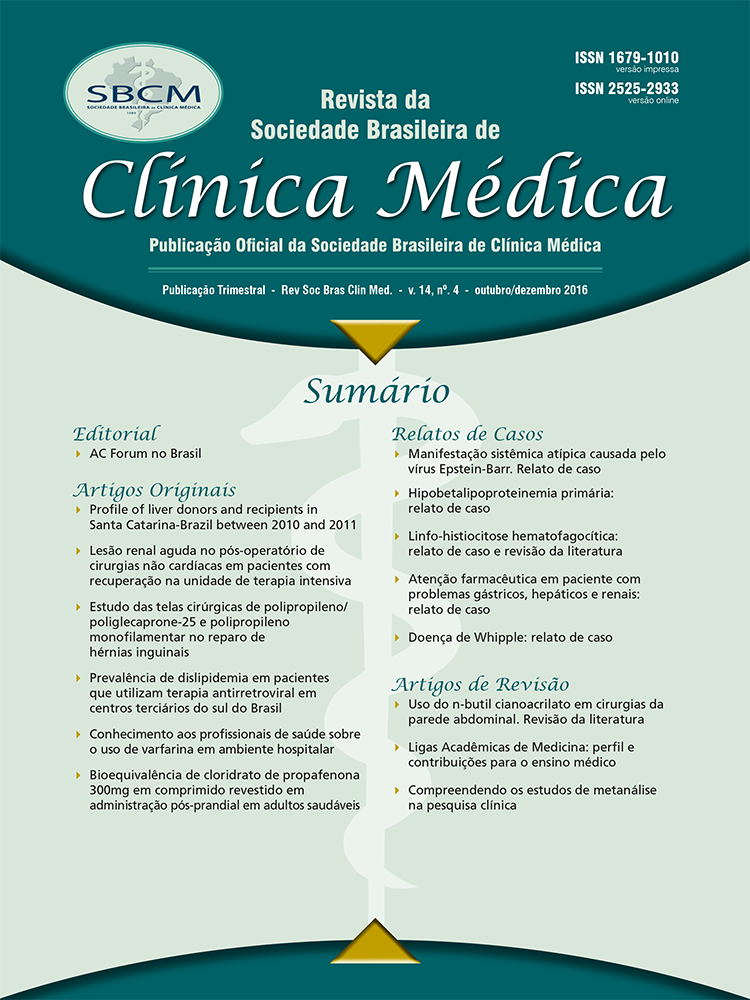Study of variables involved in hospital-acquired urinary tract infections at a university hospital
Main Article Content
Resumo
OBJECTIVE: Analyze bacteria involved in urinary tract nosocomial infections (UTIs), their sensitivity profile, and other correlated clinical variables. METHODS: This was a retrospective study, based on the analysis of positive urine culture reports (from 100,000CFU/ml) for nosocomial infection covering the years 2009, 2010 and 2011, and on medical records. Statistical analysis was performed through SPSS 19.0 software, using chi-square tests with Yates correction and Pearson’s correlation coefficient. p<0.05 was considered statistically significant. RESULTS: The sample consisted of 74 positive urine cultures, 64.9% of which from females, and 58.1% of which from patients above 50 years of age. Medical conditions accounted for 87.8% of cases, and nervous and gastrointestinal problems were the most prevalent. Hospital stay ranged from 56.7±35.7 days; 51.4% of the patients used indwelling urinary catheter, 54% of whom over a 30 day period. Klebsielle pneumoniae and Escherichia coli together accounted for 60.8% of cases. Amikacin, Gentamicin, Cefoxitin, Piperacillin-tazobactam, Imipem, Meropenem and Ertapenem showed ≥50% sensitivity. There were correlations between symptoms associated to UTI and antibiotic use after urine culture (p=0.02), and catheter use and duration of hospital stay (p=0.04). CONCLUSIONS: Female patients over 50 years of age with underlying clinical conditions originated in the nervous system or the gastrointestinal apparatus making use of indwelling urinary catheters for over 30 days and a hospital stay period of 56.7±35.7 days are more likely to develop nosocomial UTIs. Amikacin, Gentamycin and Cefoxitin are feasible options for empirical antibiotic therapy against the two most prevalent bacteria.
Article Details
Declaração de Direito Autoral
Eu (nome do autor responsável) _______________________________________________ declaro que o presente artigo intitulado ___________________________________é original, não tendo sido submetido à publicação em qualquer outro periódico nacional ou internacional, quer seja em parte ou em sua totalidade. Declaro, ainda, que uma vez publicado na revista Revista da Sociedade Brasileira de Clinica Médica, editada pela Sociedade Brasileira de Clínica Médica, o mesmo jamais será submetido por um dos demais co-autores a qualquer outro meio de divulgação científica impressa ou eletrônica.
Por meio deste instrumento, em meu nome e dos demais co-autores, cedo os direitos autorais do referido artigo à Revista da Sociedade Brasileira de Clinica Médica, e declaro estar ciente de que a não observância deste compromisso submeterá o infrator a sanções e penas previstas na Lei de Proteção de Direitos Autorias (n 9610 19 de fevereiro de 1998) que altera, atualiza e consolida a legislação sobre direitos autorais e dá outras providências. Disponível em: http://www.planalto.gov.br/ccivil_03/leis/l9610.htm
|
_________________________ |
___________________ |
|
Local, data |
Assinatura |
SOCIEDADE BRASILEIRA DE CLÍNICA MÉDICA
CNPJ/MF 062.279.617/0001-45
Rua Botucatu, nº 572, cj. 112, São Paulo, SP
Download da Declaração de Direito Autoral.
